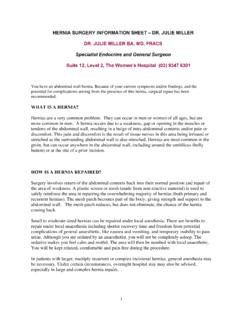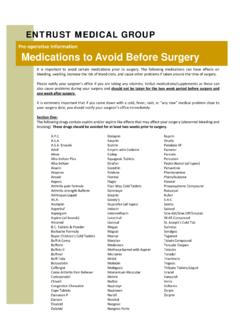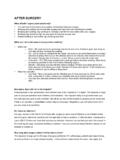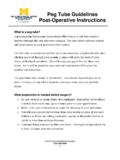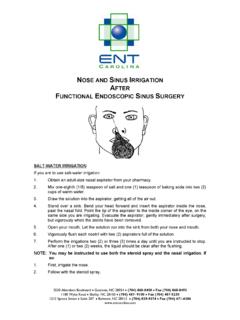Transcription of THYROID SURGERY INFORMATION SHEET A/PROFESSOR JULIE MILLER ...
1 1 THYROID SURGERY INFORMATION SHEET A/PROFESSOR JULIE MILLER BA, MD, FRACS Specialist Endocrine Surgeon Suite 12, Level 2, The Women s Hospital (03) 9347 8786 What is the THYROID ? The THYROID is a butterfly-shaped gland that sits in your neck, draped across the windpipe and just under the larynx (voice box, adam s apple.) It makes THYROID hormone, which controls your body s metabolism, including weight, heart rate, temperature, and mental alertness. An enlarged THYROID is called a goiter. Most thyroids with a goiter or a lump still work properly, but some may be overactive. Indications for THYROID SURGERY There are several reasons to have THYROID SURGERY , including: 1. To treat THYROID cancer that has been diagnosed by FNA (needle biopsy) 2. To diagnose whether a lump is THYROID cancer when FNA (needle biopsy) is suspicious or inconclusive (follicular or Hurthle cell lesion, or neoplasm).
2 Eighty percent (80%) of these turn out to be benign and require no further treatment. About 20% of these to prove to be cancer. If there is cancer, a second operation is usually required to remove the rest of the THYROID gland. 3. For pressure symptoms, coughing, difficulty swallowing or a choking feeling 4. If the nodule or gland is growing over time 5. If your doctor is concerned for other reasons like size, appearance, family history, or extension into the chest 6. For cosmetic reasons, if a large goiter is unsightly 7. As one of several options to treat an overactive THYROID . 2 Frequently Asked Questions What are the potential complications of THYROID SURGERY ? The nerves that control your voice are closely associated with the THYROID gland. Temporary voice changes are common, but usually resolve within weeks to months.
3 In 1 in 100 parathyroid operations, the nerve that controls the voice is permanently injured, leaving your voice hoarse. Some patients have difficulty with projection of the voice and production of high pitched sounds. This problem is more common, and may affect your singing voice. Voice fatigue may occur as well. Sometimes the parathyroid glands will not function after a total thyroidectomy. These are four tiny, delicate glands that are located on the THYROID capsule. The parathyroid glands control calcium levels. If they don t work, you will have low blood calcium. Therefore, some patients require calcium tablets on a temporary basis. If the parathyroids do not recover, calcium and vitamin D may be needed on a permanent basis. This occurs in about 3 in 100 total thyroidectomy operations. There is a small risk of bleeding into the space where the THYROID used to be.
4 If this happens, it may be necessary to have a second operation to evacuate the blood so it does not interfere with your breathing. Infection is relatively uncommon after this operation, but is easy to treat should it occur. WHAT ARE THE RISKS OF THYROID SURGERY ? As with anything in life, there are risks to SURGERY . These risks are weighed against the risks of not having SURGERY . Listed below are some of the possible complications of SURGERY . Risks include, but are not limited to: Permanent voice ..1% Permanent parathyroid damage(need calcium tablets)..3% (total thyroidectomy only) Infection of ..Less than 1% Haematoma or ..Less than 1% Seroma (fluid collection, swelling)..5% (higher for very large thyroids) Swelling and 5-10% (temporary) Needing THYROID tablets after removing half of 10-20% Keloid or overgrown.
5 Uncommon in Caucasians 10-20% in Asians, Indians, Africans Scar early, usually settles with time Other unforeseen risks You will require general anaesthetic, given by a specialist anaesthetist. I work with a select group of outstanding anaesthetists. Risk of a serious complication in a healthy person is very rare. Potential risks include, but are not limited to: Heart problems (death, heart attack, arrhythmias) Lung problems (pneumonia, wheezing) Blood clots (stroke, clots in leg veins or lungs) Drug reactions (also possible with local anaesthetic) Chipped teeth Other unforeseen risks You will meet the anaesthetist before your operation and have the chance to ask any additional questions. How much of my THYROID will be removed? That depends on your condition.
6 When the entire THYROID is removed, the operation is called a total thyroidectomy. You will need THYROID hormone replacement for life. A THYROID lobectomy or hemithyroidectomy is when half the 3 THYROID is removed. In most instances (~80%), the remaining half can make enough THYROID hormone and you will not need tablets. What type of anesthesia will I have? You will have a general anesthesia. You will be completely asleep during the operation. You will have local anasthesia injected into the neck (cervical plexus block) to make you even more comfortable when you wake up. This local anaesthetic block will probably leave your ear lobes numb for 24 hours as well. Will I have a scar? Yes. All SURGERY causes a scar, and how a patient scars is dependent on the individual. A THYROID scar is a horizontal scar on the neck.
7 The length of the scar depends on the size of your THYROID and the size of your neck, but is usually 5-6 cm ( inches.) Techniques I use to minimize scarring include careful incision placement and hypoallergenic suture material (to avoid inflammation) I place my THYROID incisions in a natural skin crease, and it will be higher than most other surgeons scars, as I believe the cosmetic result is better when the scar is in the shadow of the chin. In patients prone to keloids, I use skin glue rather than sutures. As a general rule, it is unusual to have a very noticeable scar after six months. Scars continue to fade for three years. Will I have pain after the operation? Most patients are surprised at how comfortable they are after THYROID SURGERY . Although you should be able to eat and drink normally, the main complaint is sore throat and discomfort with swallowing.
8 Most patients take Panadol and/or Nurofen to keep them comfortable at home. You can have a prescription for something stronger for the first few days in case you need it, but beware prescription pain medicine can make you drowsy and constipated, so do not drive or operate heavy machinery, and drink lots of water and eat plenty of fruits and vegetables. How long will I be hospitalized? Most patients are admitted to the hospital on the morning of their SURGERY . If only half of your THYROID is removed, you may be able to go home that same evening, depending on how you feel. If you don t feel well enough to go home, if your SURGERY was late in the day, if you live alone or far away, or if you ve had the entire THYROID removed, you will be able to go home the next day. When will I know the findings of the SURGERY ?
9 A final pathology report requires careful study of the surgical specimen. Therefore, the final report is usually not available until about one week after the operation. Will I have stitches? You will have stitches on the inside that dissolve on their own. You will have a waterproof Comfeel dressing so that you can shower or bathe as usual (but do not submerge the incision for 5 days). Leave the dressing in place until your first post-operative visit, where it will be removed. Will I have any physical restrictions after my SURGERY ? In general, your activity level depends on the amount of discomfort you experience. Many patients have resumed golf or tennis within a week after the operation. Most patients return to work in a week or two, and you are able to 4 drive as soon as your head can be turned comfortably without prescription pain pills (this limitation is for driver safety).
10 PREPARATION for SURGERY o Please shower at home the evening before or the morning of SURGERY . o For morning SURGERY , Do Not Eat or Drink anything after midnight the night before SURGERY unless otherwise instructed. This includes coffee, tea, water, and juice! Medication with a small sip of water is OK. For afternoon SURGERY , a small breakfast before 7AM is OK, and nothing after that. Your SURGERY may be cancelled if you do not follow these instructions. o Do Not Drink Alcoholic beverages 24 hours prior to your SURGERY . o Do Not Smoke for 4 weeks before SURGERY or your risk of serious complications increases. o Ask us if you are permitted to take your routine medications (such as those for heart, blood pressure, or insulin etc.) before arriving for SURGERY . o Stop aspirin, warfarin, or any other blood thinner 5-7 days prior to SURGERY o Do Not bring valuables such as money, jewelry etc.
